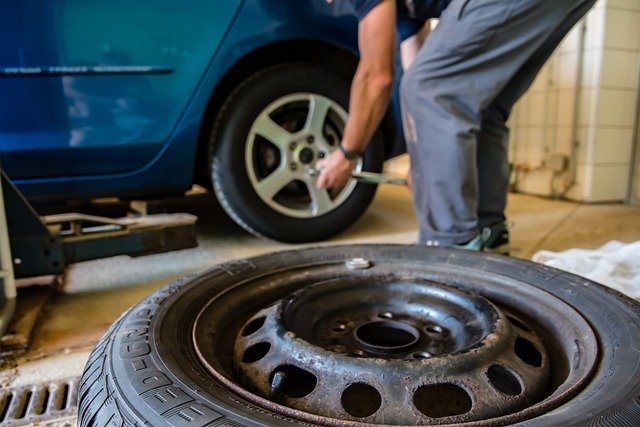Tire Changers: Essential Equipment for Auto Maintenance
A tire changer is a specialized piece of equipment used in automotive maintenance to remove and install tires on vehicle wheels. This tool is crucial for tire shops, auto repair centers, and professional mechanics, enabling them to efficiently handle tire replacements and rotations. Tire changers come in various types and configurations, each designed to accommodate different wheel sizes and tire types.

The process typically involves these steps:
-
Securing the wheel on the turntable
-
Using a bead breaker to separate the tire’s bead from the rim
-
Employing mounting arms or rollers to pry the tire off the wheel
-
Placing the new tire onto the wheel
-
Using pneumatic or hydraulic pressure to seat the tire bead onto the rim
Modern tire changers often incorporate additional features like bead rollers, helper arms, and inflation systems to make the process faster and reduce the risk of damage to tires or wheels.
What types of tire changers are available?
Tire changers come in several varieties to suit different needs and budgets. The main types include:
-
Manual tire changers: These basic models require more physical effort but are portable and suitable for occasional use or small operations.
-
Semi-automatic tire changers: These machines automate some parts of the process, such as the bead breaking and wheel rotation, making them more efficient for moderate usage.
-
Fully automatic tire changers: These high-end models handle most of the tire changing process with minimal operator intervention, ideal for high-volume tire shops.
-
Leverless tire changers: Designed to work without traditional tire irons, these machines are particularly useful for handling delicate alloy wheels and low-profile tires.
-
Heavy-duty tire changers: Specialized equipment for large truck, agricultural, or off-road vehicle tires.
The choice of tire changer depends on factors such as the types of vehicles serviced, the volume of work, and the available budget.
What are the benefits of using a tire changer?
Employing a tire changer in a professional setting offers several advantages:
-
Efficiency: Tire changers significantly reduce the time required to remove and install tires compared to manual methods.
-
Consistency: These machines provide a standardized process, ensuring consistent results across different tire changes.
-
Reduced risk of damage: Proper use of a tire changer minimizes the chance of damaging expensive wheels or tires during the mounting process.
-
Improved safety: Tire changers reduce the physical strain on operators and decrease the risk of injuries associated with manual tire changing.
-
Versatility: Modern tire changers can handle a wide range of wheel sizes and tire types, including run-flat and low-profile tires.
-
Precision: Many tire changers include features that help ensure proper bead seating and inflation, critical for tire performance and safety.
What features should you look for in a tire changer?
When selecting a tire changer for a shop or personal use, consider the following features:
-
Turntable size and clamping range: Ensure the machine can accommodate the wheel sizes you commonly work with.
-
Bead breaker design: Look for models with adjustable or two-stage bead breakers for versatility.
-
Mount/demount head: Consider machines with plastic-coated or leverless heads to protect alloy wheels.
-
Helper arms: These assist with difficult tire and wheel combinations, particularly useful for low-profile tires.
-
Inflation system: Built-in inflation capabilities can streamline the process and ensure proper tire seating.
-
Speed and torque settings: Adjustable settings allow for handling different tire types safely.
-
Warranty and support: Choose reputable brands with good customer service and parts availability.
How much does a tire changer cost?
The cost of a tire changer can vary significantly based on its type, features, and capacity. Here’s a general overview of tire changer pricing:
| Type of Tire Changer | Average Cost Range |
|---|---|
| Manual Tire Changer | $200 - $500 |
| Semi-Automatic Tire Changer | $1,500 - $3,500 |
| Fully Automatic Tire Changer | $3,000 - $8,000 |
| Leverless Tire Changer | $5,000 - $15,000 |
| Heavy-Duty Tire Changer | $7,000 - $25,000+ |
Prices, rates, or cost estimates mentioned in this article are based on the latest available information but may change over time. Independent research is advised before making financial decisions.
When considering the cost of a tire changer, it’s important to factor in not just the initial purchase price but also ongoing maintenance, potential repairs, and the value of increased efficiency in your operations.
In conclusion, tire changers are indispensable tools in the automotive maintenance industry. They offer significant benefits in terms of efficiency, safety, and precision when handling tire changes. By understanding the different types available and the features that matter most for your specific needs, you can make an informed decision when investing in this essential piece of equipment for your auto shop or personal garage.





